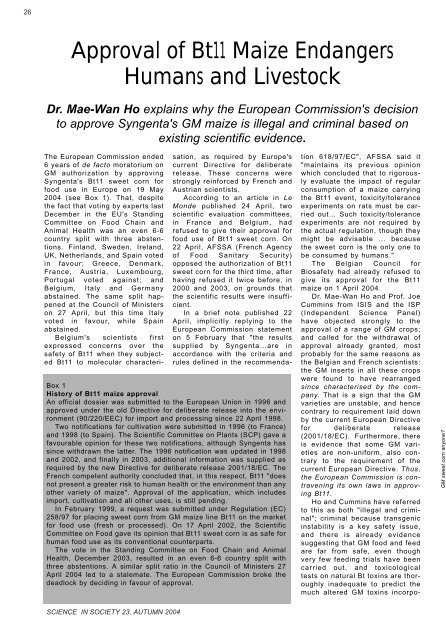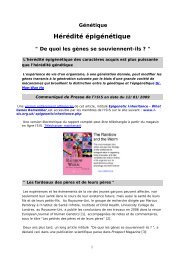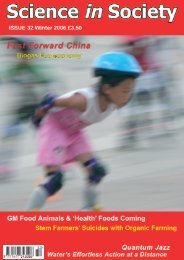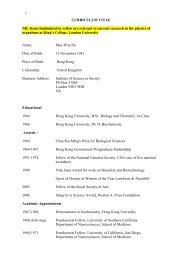Ethiopia goes organic to feed herself - The Institute of Science In ...
Ethiopia goes organic to feed herself - The Institute of Science In ...
Ethiopia goes organic to feed herself - The Institute of Science In ...
Create successful ePaper yourself
Turn your PDF publications into a flip-book with our unique Google optimized e-Paper software.
26<br />
Approval <strong>of</strong> Bt11 Maize Endangers<br />
Humans and Lives<strong>to</strong>ck<br />
Dr. Mae-Wan Ho explains why the European Commission's decision<br />
<strong>to</strong> approve Syngenta's GM maize is illegal and criminal based on<br />
existing scientific evidence.<br />
<strong>The</strong> European Commission ended<br />
6 years <strong>of</strong> de fac<strong>to</strong> mora<strong>to</strong>rium on<br />
GM authorization by approving<br />
Syngenta's Bt11 sweet corn for<br />
food use in Europe on 19 May<br />
2004 (see Box 1). That, despite<br />
the fact that voting by experts last<br />
December in the EU's Standing<br />
Committee on Food Chain and<br />
Animal Health was an even 6-6<br />
country split with three abstentions.<br />
Finland, Sweden, Ireland,<br />
UK, Netherlands, and Spain voted<br />
in favour; Greece, Denmark,<br />
France, Austria, Luxembourg,<br />
Portugal voted against; and<br />
Belgium, Italy and Germany<br />
abstained. <strong>The</strong> same split happened<br />
at the Council <strong>of</strong> Ministers<br />
on 27 April, but this time Italy<br />
voted in favour, while Spain<br />
abstained.<br />
Belgium's scientists first<br />
expressed concerns over the<br />
safety <strong>of</strong> Bt11 when they subjected<br />
Bt11 <strong>to</strong> molecular characteri-<br />
Box 1<br />
His<strong>to</strong>ry <strong>of</strong> Bt11 maize approval<br />
An <strong>of</strong>ficial dossier was submitted <strong>to</strong> the European Union in 1996 and<br />
approved under the old Directive for deliberate release in<strong>to</strong> the environment<br />
(90/220/EEC) for import and processing since 22 April 1998.<br />
Two notifications for cultivation were submitted in 1996 (<strong>to</strong> France)<br />
and 1998 (<strong>to</strong> Spain). <strong>The</strong> Scientific Committee on Plants (SCP) gave a<br />
favourable opinion for these two notifications, although Syngenta has<br />
since withdrawn the latter. <strong>The</strong> 1996 notification was updated in 1998<br />
and 2002, and finally in 2003, additional information was supplied as<br />
required by the new Directive for deliberate release 2001/18/EC. <strong>The</strong><br />
French competent authority concluded that, in this respect, Bt11 "does<br />
not present a greater risk <strong>to</strong> human health or the environment than any<br />
other variety <strong>of</strong> maize". Approval <strong>of</strong> the application, which includes<br />
import, cultivation and all other uses, is still pending.<br />
<strong>In</strong> February 1999, a request was submitted under Regulation (EC)<br />
258/97 for placing sweet corn from GM maize line Bt11 on the market<br />
for food use (fresh or processed). On 17 April 2002, the Scientific<br />
Committee on Food gave its opinion that Bt11 sweet corn is as safe for<br />
human food use as its conventional counterparts.<br />
<strong>The</strong> vote in the Standing Committee on Food Chain and Animal<br />
Health, December 2003, resulted in an even 6-6 country split with<br />
three abstentions. A similar split ratio in the Council <strong>of</strong> Ministers 27<br />
April 2004 led <strong>to</strong> a stalemate. <strong>The</strong> European Commission broke the<br />
deadlock by deciding in favour <strong>of</strong> approval.<br />
sation, as required by Europe's<br />
current Directive for deliberate<br />
release. <strong>The</strong>se concerns were<br />
strongly reinforced by French and<br />
Austrian scientists.<br />
According <strong>to</strong> an article in Le<br />
Monde published 24 April, two<br />
scientific evaluation committees,<br />
in France and Belgium, had<br />
refused <strong>to</strong> give their approval for<br />
food use <strong>of</strong> Bt11 sweet corn. On<br />
22 April, AFSSA (French Agency<br />
<strong>of</strong> Food Sanitary Security)<br />
opposed the authorization <strong>of</strong> Bt11<br />
sweet corn for the third time, after<br />
having refused it twice before, in<br />
2000 and 2003, on grounds that<br />
the scientific results were insufficient.<br />
<strong>In</strong> a brief note published 22<br />
April, implicitly replying <strong>to</strong> the<br />
European Commission statement<br />
on 5 February that "the results<br />
supplied by Syngenta…are in<br />
accordance with the criteria and<br />
rules defined in the recommendation<br />
618/97/EC", AFSSA said it<br />
"maintains its previous opinion<br />
which concluded that <strong>to</strong> rigorously<br />
evaluate the impact <strong>of</strong> regular<br />
consumption <strong>of</strong> a maize carrying<br />
the Bt11 event, <strong>to</strong>xicity/<strong>to</strong>lerance<br />
experiments on rats must be carried<br />
out… Such <strong>to</strong>xicity/<strong>to</strong>lerance<br />
experiments are not required by<br />
the actual regulation, though they<br />
might be advisable … because<br />
the sweet corn is the only one <strong>to</strong><br />
be consumed by humans."<br />
<strong>The</strong> Belgian Council for<br />
Biosafety had already refused <strong>to</strong><br />
give its approval for the Bt11<br />
maize on 1 April 2004.<br />
Dr. Mae-Wan Ho and Pr<strong>of</strong>. Joe<br />
Cummins from ISIS and the ISP<br />
(<strong>In</strong>dependent <strong>Science</strong> Panel)<br />
have objected strongly <strong>to</strong> the<br />
approval <strong>of</strong> a range <strong>of</strong> GM crops;<br />
and called for the withdrawal <strong>of</strong><br />
approval already granted, most<br />
probably for the same reasons as<br />
the Belgian and French scientists:<br />
the GM inserts in all these crops<br />
were found <strong>to</strong> have rearranged<br />
since characterised by the company.<br />
That is a sign that the GM<br />
varieties are unstable, and hence<br />
contrary <strong>to</strong> requirement laid down<br />
by the current European Directive<br />
for deliberate release<br />
(2001/18/EC). Furthermore, there<br />
is evidence that some GM varieties<br />
are non-uniform, also contrary<br />
<strong>to</strong> the requirement <strong>of</strong> the<br />
current European Directive. Thus,<br />
the European Commission is contravening<br />
its own laws in approving<br />
Bt11.<br />
Ho and Cummins have referred<br />
<strong>to</strong> this as both "illegal and criminal";<br />
criminal because transgenic<br />
instability is a key safety issue,<br />
and there is already evidence<br />
suggesting that GM food and <strong>feed</strong><br />
are far from safe, even though<br />
very few <strong>feed</strong>ing trials have been<br />
carried out, and <strong>to</strong>xicological<br />
tests on natural Bt <strong>to</strong>xins are thoroughly<br />
inadequate <strong>to</strong> predict the<br />
much altered GM <strong>to</strong>xins incorpo-<br />
GM sweet corn anyone?<br />
SCIENCE IN SOCIETY 23, AUTUMN 2004











